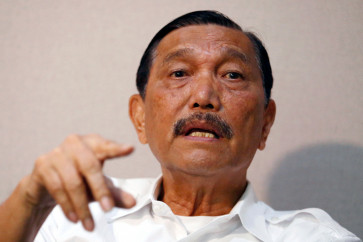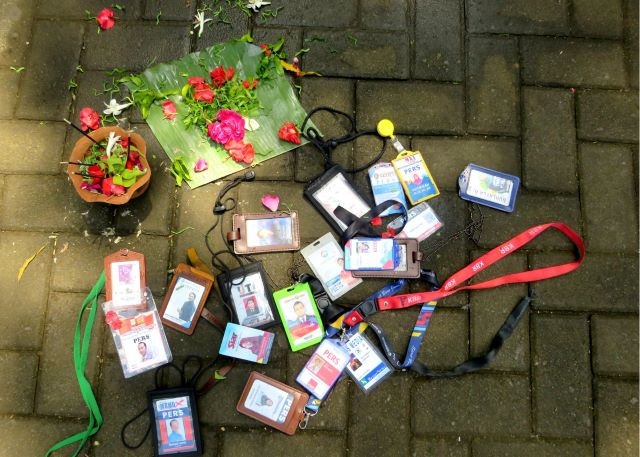Some practical problems in stolen asset recovery
"The return of the assets pursuant to United Nations Convention Against Corruption (UNCAC) is a fundamental principle and state parties shall afford one another the widest measure of cooperation and assistance in this regard"
Change Size

"The return of the assets pursuant to United Nations Convention Against Corruption (UNCAC) is a fundamental principle and state parties shall afford one another the widest measure of cooperation and assistance in this regard".
This is not the statement of a political party or an NGO. This is a provision of law contained in Article 51 of UNCAC, whose state parties concluded their second conference in Bali on Friday.
UNCAC clearly states that "asset recovery" or the return of corruptor's assets from the state where the assets are located to the state that becomes the injurious party due to the corruption is very pivotal. This means that cooperation between two state parties of UNCAC may result in the extradition, the prosecution, the conviction and the imprisonment of the corruptor.
Indonesia's previous experience in this regard is not encouraging. In the only one extradition case Indonesia has handled, complicated legal conditions have resulted in Indonesia failing to extradite Hendra Rahardja, earlier convicted of corruption, from Australia to Indonesia, although both states are bound by an extradition treaty. So far, no stolen assets have been returned to Indonesia from any state where the assets are located.
Will all the difficulties in this regard be abolished by the entry into force of UNCAC? Will it be easy to extradite the accused and convicted and seize their assets by the enforcement of UNCAC provisions?
UNCAC honors the supremacy of national or domestic laws. Lots of its provisions contain a "subject to domestic law" condition. In relation to asset recovery, Article 53 paragraph (c) of the Convention reads:
"Each state party shall, in accordance with its domestic law, take such measures necessary to permit its court or competent authorities, when having to decide on confiscation to recognize another state party's claim as a legitimate owner of property acquired through the commission of an offense established in accordance with this Convention."
Further, Article 54, paragraph 1, sub paragraph (a) states:
"Each State Party, in order to provide mutual legal assistance pursuant to article 55 of this Convention with respect to property acquired through or involved in the commissions of an offense established in accordance with this Convention, shall, in accordance with its domestic law, take such measures as may be necessary to permit its competent authorities to give effect to an order of confiscation issued by a court of another State party."
The "subject to domestic law" condition is legal and, indeed, polite. However, it should be admitted that such a condition hampers the immediate enforcement of UNCAC. The confiscation under Article 53 and/or 54 of UNCAC, for example, cannot be conducted by a legal enforcement agency of a state party, if the law enforcer finds no legal basis in its domestic law to proceed with such confiscation. Hence, the "subject to domestic law" condition may result in the delay of the enforcement of UNCAC.
What assets can be confiscated under UNCAC? The provisions of the convention answering this question are not consistent. On the one hand, Article 31 of UNCAC states that the assets that can be confiscated under the convention are:
a. Proceeds of crime (proceeds of corruption)
b. Property the value of which corresponds to that of such proceeds;
c. Property, equipment and other instrumentalities used to commit the corruption;
On the other hand, Article 53 of the convention states the assets that can be confiscated are "property acquired through" corruption, where as Article 54 provides the assets that can be confiscated are "property acquired through or involved in" corruption.
The inconsistency is very confusing. Article 53 states a corrupter's assets can be confiscated if the law enforcer can prove that the assets derive from corruption. Article 54 states that even though certain assets do not derive from corruption, they can be confiscated, if the law enforcer can prove that the assets are involved in corruption, like becoming instrumentalities in committing corruption.
How about assets that are legally acquired by a graft convict? Under Article 53 of UNCAC these legal assets cannot be confiscated. Under Article 54 the assets can be confiscated if they are involved in the commission of a corruption. Under Article 31 they can be confiscated, even if they are not involved in corruption, if their value corresponds to the proceeds of corruption committed by the convict.
Another legal instrument that is effective to enforce UNCAC provisions on asset recovery is the "disclosure order". In this case, the court issues an order to a suspect in a corruption case to disclose all information relating to his assets and hands to the claiming state all documents that are relevant to the information.
In practice, a disclosure order that can be enforced globally is required. If an injurious state party finds that an injuring corrupter owns a bank account in another state party, it needs not only to have the bank account frozen by the court, but also to obtain a court order obligating the corrupter and the bank to disclose all information and documents relating to the accused's bank account.
If the disclosed documents show that the accused's account was used to receive transfers of money from some other banks located in other state parties, all banks in various states that are involved in the transfer of money should also be obligated to disclose all information and documents relating to the transfers.
Unfortunately, there is no provision in UNCAC relating to court disclosure orders. Article 52, paragraph 5, of the Convention says something about a "financial disclosure system". This provision, however, is applicable only to "public officials".
In Indonesia, obtaining a disclosure order is a legally difficult effort. Indonesian law does not recognize such court orders. UNCAC, which was ratified in a 2006 Indonesian law, can not be used as the legal basis for filing a petition to issue a disclosure order before an Indonesian court.
The traditional way to overcome legal problems is the amendment of the law. UNCAC needs amending. Admittedly, however, it took years to have UNCAC entered into force. It will also take years to have its amendment come into force.
Another alternative is to harmonize domestic laws in order to expedite the enforcement of UNCAC. This means that state parties should speedily change their domestic law provisions, if the current provisions hamper the enforcement of UNCAC. Judging from the Indonesian experience in legislation processes, I should admit that this also will take years.
We still have another alternative relevant to the purpose of striving for the smooth and immediate enforcement of UNCAC, namely "judicial initiative", known also as "precedents" or "judge-made laws". UNCAC will be fully enforced if judges are willing to enforce its provisions in corruption cases that are adjudicated before them, even though their domestic laws are still not conducive to the enforcement of UNCAC provisions.
The writer is a public prosecutor and state attorney. This is a personal opinion.









